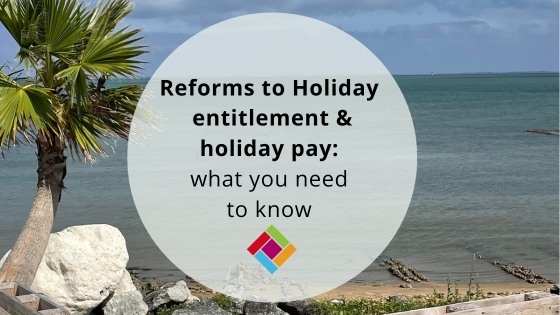
The government has introduced reforms to simplify holiday entitlement and calculate holiday pay. It affects:
- irregular hours workers and part-year workers
- accrual of COVID-19 carryover of leave
- rates of holiday pay and annual leave
- rolled-up holiday pay
The majority of these changes apply to leave years either on or after 1 April 2024, however, there are some changes effective from 1 January 2024. These changes include the introduction of a new accrual method for workers with irregular hours and part-year workers. Here’s what you need to know.
Who does it apply to?
Irregular hours workers
A ‘worker’ is someone who has the employment status of either a worker or an employee, as set out in their employment contract or workers agreement and who has entitlement to holiday pay. Irregular hours are hours of work that are not set each week, instead, the hours that a worker is required to work vary each week and are mostly not the same in each pay period.
Part-year workers
A part-year worker is only required to work for part of the year, meaning there are periods in the year when they are not required to work and are not paid. These periods must be for a minimum of at least a week. Part-year workers can be on fixed hours.
An example would be a seasonal worker who is only required to work during the summer months and who is not contracted to work the remaining months of the year.
Who does this not apply to?
- Employees who have fixed contractual hours and are required to work throughout the year;
- Self-employed contractors/consultants with no entitlement to holiday pay;
- Employees who are paid a salary over 12 months, even if there are periods when they are not working;
What are the changes?
- Irregular hours workers and part-year workers are now clearly defined.
- Irregular hours workers and part-year workers now have a standardised method for calculating holiday entitlement and holiday pay. This method must be used by employers for leave years starting on or after 1st April 2024.
- Previously workers could carry over untaken leave into the next two years if their work had been affected by Covid. From 1st January 2024, this no longer applies.
- Clarity has been provided on what should be included in holiday pay rates.
- Rolled-up holiday pay is permitted as an additional method for the calculation of irregular hours and part-year workers, for leave years beginning on or after 1st April 2024.
What is rolled-up holiday pay?
Rolled-up holiday pay means employers can make an additional payment to workers in each payslip to cover holiday pay rather than paying holiday pay when a worker takes annual leave.
Rolled-up holiday pay is only permitted for irregular hours workers and part-year workers.
How do I calculate holiday entitlement?
For workers who are not irregular hours or part-year workers, there is no change in how statutory holiday entitlement is accrued and calculated.
For holiday years beginning on or after 1st April 2024, the holiday accrual method for irregular hours workers and part-year workers will change. Holiday entitlement for these workers should be calculated as 12.07% of the actual hours worked in each pay period.
Example
An employee works irregular hours and is paid monthly. The holiday entitlement is the statutory 28 days, and the leave year begins 1st April 2024.
In May the employee works 70 hours. To work out the accrued holiday in May, you will calculate 12.07% of 70 hours.
70 x 12.07% = 8.449 hours (this can be rounded up or down to the nearest hour).
The 12.07% figure is based on the fact that all workers are entitled to 5.6 weeks’ leave.
Additional Information:
- From 1st January 2024, workers can no longer accrue Covid carry-over leave.
- From 1 January 2024, the components which must be included when calculating ‘normal’ rate of holiday pay are defined as:
- Contractual payments such as commission;
- Regular overtime payments;
- Length of service and seniority payments.
- Employers who want to implement rolled-up holiday pay will need to ensure a contract variation is agreed upon with each employee/worker.
- Where a worker has irregular hours or works part of the year, employers can calculate their holiday pay using an average from the last 52 weeks in which they have worked and have earned pay.
Find the full guidance on the Government site.